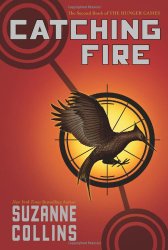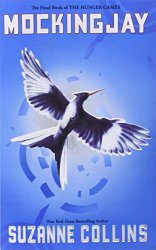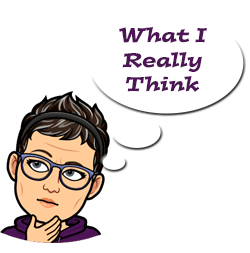 It will be hard for me to separate my reviews of Catching Fire (The Second Book of the Hunger Games)
It will be hard for me to separate my reviews of Catching Fire (The Second Book of the Hunger Games) and Mockingjay (Last book)
into two cohesive sections because I read them in the same 24-hour time span. As you may remember, I read The Hunger Games, last weekend, finishing on Sunday. Well, I started Catching Fire on Monday night and then waking Tuesday, not feeling well, finished it and read all of Mockingjay too (I felt better by the afternoon but by then it was too late, I had to finish the books).
In Catching Fire we learn what happens to Katniss when she returns home, reunites with Gale and must resolve her feelings for Peeta (remember, it’s a teen series so there must be some teen angst involved but let me say as an aside no where near the sniveling pablum involved in the The Twilight Series). We can’t linger long here though because the Capitol, especially President Snow, is not happy with our girl Katniss and is out for revenge in what may be the worst way possible. Like the first one, this one keeps you moving and like the first one, told from Katniss’s perspective, you are constantly left guessing the motivations of those with which she comes into contact. Are they helping her? Helping the country? Helping themselves? And why?
 Mockingjay starts off at the very end of Catching Fire (which does leave you with a cliff-hanger, so if you’re reading Catching Fire and you like it, make sure you have Mockingjay ready to go). There are plots within plots here as all out war has broken out in Panem and some new characters involved. Are they using our heroine to further their own political gains? Again fast paced and at points heart-breaking, but a satisfying conclusion to this trilogy – one you expect from a teen novel.
Mockingjay starts off at the very end of Catching Fire (which does leave you with a cliff-hanger, so if you’re reading Catching Fire and you like it, make sure you have Mockingjay ready to go). There are plots within plots here as all out war has broken out in Panem and some new characters involved. Are they using our heroine to further their own political gains? Again fast paced and at points heart-breaking, but a satisfying conclusion to this trilogy – one you expect from a teen novel.
Spoiler Alert
Now, don’t read any further on if you haven’t read the series – I’m warning you – I’m not going to “couch my words.”
Did I enjoy the series? Absolutely. I found it gripping and compelling.
But there are some things I don’t get, some mythology I wish was explained more.
For example:
- How far in the future do you think this really took place? Our entire society had to break down, a new society with new “morals” took it’s place, a war took place in that new society and then 74 years of Hunger Games.
- Why only hovercraft but no airplanes? Yet we still have cars? How were the cars powered? The technology in general seemed … off. If the Capitol had things to make food materialize (remember the Star Trek replicators), why not just disseminate that technology to everyone? Who was making all the medicine? And why was medical technology so advanced? I guess there were things in this society, technology wise, that I found inconsistent at best but more unbelievable than anything else.
- A general problem I have with futuristic dystopia societies that replace our own, why doesn’t anyone ever talk about what happens to religion? It drives our every day lives so much (especially now), and yet, it’s completely absent here. Same with the rest of the world? What’s going on in Europe, South America, Africa, etc.? We never know.
Then there are other questions about the motivations of people. Learning about the Holocaust from a young age, I always wondered why the Jews didn’t fight back? Why go straight to the concentration camps? Didn’t they know? Isn’t it better to die on “one’s feet?” I used to have nightmares about that. As I got older I understood the other side – there’s something to be said about surviving at all costs…
I found myself asking the very same questions while reading these books. Why did the people stay in their districts? Why not runaway? Fight back? If they all stopped supplying the capitol, wouldn’t it fall? Why not just … sit down? Do you know what I mean? Peaceful rebellion, refuse to work. I understand that it would need to be coordinated between colonies to work and you do have the feeling that communication between districts was limited but at some point it happened or did it not happen until district 13 finally got involved? (By the way, I kept expecting them to be deformed a la Beneath the Planet of the Apes).
One thing I did “like” and I don’t mean I enjoy people dying but it impressed me how much the author had me, as a reader, invested in Katniss that I couldn’t break down until she did. For example, with Finnick, one minute he was there and the next he wasn’t but I couldn’t stop to linger over his death because it was the middle of a fight and everyone’s safety was still a concern. The same with Prim, when it happened, well I didn’t cry (and yes I cried – hey I cried when Dumbledore and Doby died too!), until Katniss finally did.
I also would like to take back my comment about Katniss being “dense.” She’d endured so much, you forget that she was only 16 – 17 years old throughout the book. If anything, it’s amazing she did as well as she did – the embodiment of the reluctant hero, and unfortunately a pawn right to the end. I’m thinking surviving was probably the only victory she could have.
So I would love to hear what others think about this … I’m still chewing it over in my mind which I guess is a sign of a good story.
